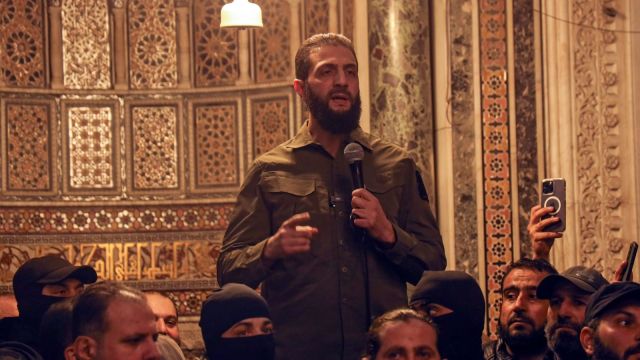Stay updated with the latest - Click here to follow us on Instagram
‘Syria being purified’: Rebel leader Abu Jolani’s speech on victory, survival after Assad’s rule comes to end
Jolani also made a pointed reference to Iran, signalling that Tehran’s influence in Syria has come to an end.
 Abu Mohammed al-Jolani speaks at the Umayyad Mosque in Damascus Sunday Dec. 8, 2024. Golani, a former al-Qaida commander who cut ties with the group and says he embraces pluralism and religious tolerance, leads the biggest rebel faction and is poised to chart the country's future. He calls himself by his given name, Ahmad al-Sharaa, and not his nom de guerre. (AP)
Abu Mohammed al-Jolani speaks at the Umayyad Mosque in Damascus Sunday Dec. 8, 2024. Golani, a former al-Qaida commander who cut ties with the group and says he embraces pluralism and religious tolerance, leads the biggest rebel faction and is poised to chart the country's future. He calls himself by his given name, Ahmad al-Sharaa, and not his nom de guerre. (AP)Syria’s rebel leader has declared a “historic” victory from a landmark mosque in Damascus, marking a major turning point in the country’s conflict. The Islamist group Hayat Tahrir al-Sham (HTS), led by Abu Mohammad al-Jolani, successfully seized control of the capital in a lightning-fast offensive that lasted less than two weeks.
Jolani’s message was also tuned for regional powers he’ll need to keep onside, promising to clean shop. “Syria is being purified,” he said, referring to the country’s regional reputation as a narco-state, saying Assad’s Syria had “become the world’s leading source of Captagon,” an amphetamine-type drug, and criminality through the region.
“This victory, my brothers, is a victory for the entire Islamic nation,” Jolani declared, addressing his small entourage against the Umayyad Mosque’s distinctive black-and-white stone backdrop.
He continued, “This victory, my brothers, by the grace of God Almighty, comes from the sacrifices of the martyrs, the widows, and the orphans. It has come through the suffering of those who endured imprisonment.” It was a rallying cry to those who had endured hardship in the struggle against Assad’s regime.
Jolani: al-Qaeda fighter to rebel leader
Abu Mohammad al-Jolani’s journey to Damascus has been a long and transformative one, marked by a notable shift from a young al-Qaeda fighter two decades ago to a rebel commander advocating for sectarian tolerance.
His evolution has provided him ample time to strategise both his path to power and the message he intends to deliver, not just to his supporters, but also to those who may challenge his rule, as well as the powers that could sustain or undermine his position.
 Jolani’s rhetoric also aimed to reassure regional powers, promising to restore order and cleanse Syria of its negative reputation as a narco-state. (AP)
Jolani’s rhetoric also aimed to reassure regional powers, promising to restore order and cleanse Syria of its negative reputation as a narco-state. (AP)
In a moment of symbolic significance, Jolani chose the Umayyad Mosque in Damascus—one of the oldest mosques in the world—as the backdrop for his latest statement. The 1,300-year-old mosque, a revered religious site, served as a powerful location for Jolani’s message, marking his arrival not in a TV studio or a recently vacated presidential palace, but in a place steeped in historical and spiritual meaning.
His message was aimed at both those who helped propel him and his group, Hayat Tahrir al-Sham, to success in ousting Syrian President Bashar al-Assad, and at the Syrians now freed from Assad’s rule.
Jolani’s clear signal to the West; Biden responds
Jolani also made a pointed reference to Iran, signalling that Tehran’s influence in Syria had come to an end. His words seemed aimed at diminishing Iran’s role, highlighting the severing of its access to Hezbollah in Lebanon and the loss of its stronghold in Syria. This was a message that would not only be heard in Tehran but also in Tel Aviv and Washington, where Jolani is still considered a designated terrorist, with a $10 million bounty on his head.
By speaking directly to international powers, including the US, Jolani showed that he understood the geopolitical landscape and the key players that could either support or oppose his rule. His choice of CNN, an American news network, for a significant interview ahead of the offensive against Assad, was a clear signal to the West. During the interview, Jolani distanced himself from other jihadist factions, claiming to have broken from their brutal tactics.
US President Joe Biden acknowledged Jolani’s statements, saying he had “heard Jolani saying the right things,” but also emphasised that the rebel leader’s actions, rather than his words, would ultimately define his future.
Jolani’s rhetoric also aimed to reassure regional powers, promising to restore order and cleanse Syria of its negative reputation as a narco-state. He referred to Assad’s regime as having “become the world’s leading source of Captagon”—an amphetamine—and as a centre of criminality throughout the region.
In the end, Jolani’s mosque speech was not just a proclamation of his arrival in Damascus, but a message of survival, aimed at securing his position in a rapidly shifting Syrian landscape. However, it is his actions, not just his words, that will ultimately determine his fate.
(with inputs from CNN)



- 01
- 02
- 03
- 04
- 05




























